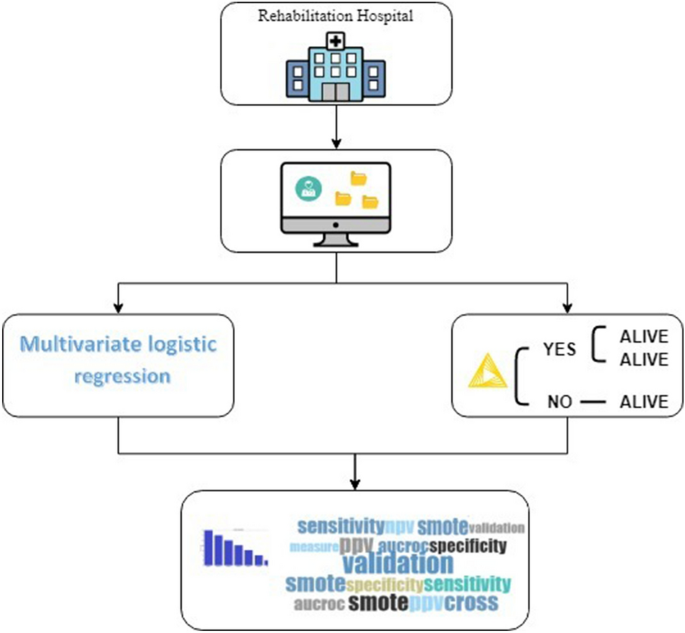Aren't you so fucking glad that our stroke researchers think it is so important to predict mortality? Just maybe you want them to do something more important, like recovery? That will only occur if we get survivors in charge. I would fire the lot of you.
Machine learning to predict mortality after rehabilitation among patients with severe stroke
Scientific Reports volume 10, Article number: 20127 (2020)
Abstract
Stroke is among the leading causes of death and disability worldwide. Approximately 20–25% of stroke survivors present severe disability, which is associated with increased mortality risk. Prognostication is inherent in the process of clinical decision-making. Machine learning (ML) methods have gained increasing popularity in the setting of biomedical research. The aim of this study was twofold: assessing the performance of ML tree-based algorithms for predicting three-year mortality model in 1207 stroke patients with severe disability who completed rehabilitation and comparing the performance of ML algorithms to that of a standard logistic regression. The logistic regression model achieved an area under the Receiver Operating Characteristics curve (AUC) of 0.745 and was well calibrated. At the optimal risk threshold, the model had an accuracy of 75.7%, a positive predictive value (PPV) of 33.9%, and a negative predictive value (NPV) of 91.0%. The ML algorithm outperformed the logistic regression model through the implementation of synthetic minority oversampling technique and the Random Forests, achieving an AUC of 0.928 and an accuracy of 86.3%. The PPV was 84.6% and the NPV 87.5%. This study introduced a step forward in the creation of standardisable tools for predicting health outcomes in individuals affected by stroke.
Introduction
Stroke is among the leading causes of death and disability worldwide1,2,3,4. Approximately 20–25% of stroke survivors present severe disability5. Severe disability after stroke is associated with increased risk of mortality and readmission, wider inter-individual variation in responsiveness to rehabilitation, and higher healthcare and social costs compared with less severe strokes6,7. Moreover, there is evidence that patients with severe post-stroke disability are less likely to be admitted to specialized inpatient rehabilitation facilities (IRF) and to receive appropriate secondary prevention than those with mild-to-moderate disability8,9,10,11,12, with a possible negative impact on prognosis.
Prognostication is inherent in the process of clinical decision-making13. The assessment of risk in stroke patients with severe disability might improve clinical decision-making, prompt clinicians to consider closer surveillance and more aggressive treatment to achieve goals in secondary prevention, and influence patient management. While not routinely used in clinical practice, multivariable models are well-accepted tools to predict prognosis. Three well-known prognostic models were developed to predict 90-day or 1-year mortality in patients with acute stroke14,15,16. These models had good discriminatory properties (C statistic ranging 0.706 and 0.840). However, the application of models developed from patients with heterogeneous neurological deficits using variables recorded at acute care admission to the subset of patients with severe stroke after discharge from the acute care setting can result in miscalibrated estimates of life expectancy and decreased discriminatory value. In addition, the beneficial effect of inpatient rehabilitation on mortality might confound the association between predictors recorded at admission to acute care and mortality17,18,19.
The standard approach to develop prognostic models involves the use of statistical regression models. Correlation between covariates, nonlinearity of the association between continuous covariates and risk for the outcome of interest, and potential complex interactions among covariates represent common analytic challenges in regression modelling20,21. In comparison with statistical models, machine-learning (ML) methods have the advantages of using a larger number of predictors, requiring fewer assumptions, using an agnostic approach instead of a priori hypotheses, incorporating “multi-dimensional correlations that contain prognostic information”, and producing a “more flexible relationship among the predictor variables (alone or in combination) and the outcome”20,22,23,24. As observed by Deo24, “there may be features that are useful in combinations but not on their own”. Theoretically, these properties might allow achieve an improved model performance for prognostication of the outcome of interest.
The workflow of the study is shown in Fig. 1 and its aim was two-fold:
-
(1)
Assessing the performance of ML–based algorithms for predicting long-term mortality in stroke patients with severe disability;
-
(2)
Comparing the performance of ML algorithms to that of a standard regression model.
The workflow of the study is represented: the data of 1207 patients from three facilities of Maugeri Institute in the South and in the North of Italy were collected and used to create models through a multivariate logistic regression and tree-based ML algorithms to predict three-year mortality in stroke patients after rehabilitation.
To address these issues, we studied 1207 patients admitted to inpatients rehabilitation and classified as Case-Mix Groups (CMGs) 0108, 0109, and 0110 of the Medicare case-mix classification system25, which was specifically developed to account for “the level of severity of a given case”26. Case-mix groups 0108, 0109, and 0110 encompass the most severe strokes. Since our primary was a dichotomous outcome (dead/alive) rather than time-to-event and nearly all survivors had a complete follow-up up to three years, we chose to focus on a logistic regression analysis instead of a Cox regression analysis. We found that ML algorithms outperformed a standard regression model.

No comments:
Post a Comment